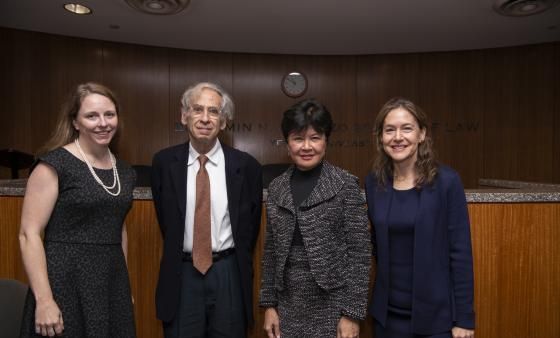
#MeToo and the Legal Profession, co-sponsored by Cardozo’s Jacob Burns Center for Ethics in the Practice of Law and Cardozo Women, brought the issues surrounding sexual harassment in the workplace, which have exploded in the media over the past year, to a more detailed legal analysis Tuesday, November 13 to a packed audience in the Jacob Burns Moot Court Room.
The two-panel event discussed and examined the #MeToo movement, its issues and effects on the profession and the evolution of the issue being taken seriously over time. The panel also focused on how those in the legal industry can serve as advocates and help enforce policies to stop harassing behaviors within the workplace.
The panels examined a range of issues, starting with basic definitions of the laws currently in existence that deal with sexual harassment and also focused on lawyers as counselors and advocates of change. Professors Roth and Sebok served as moderators and panelists included Cara Greene, Outten & Golden, Stephen Gillers, NYU School of Law; Hon. Lorna G. Schofield, Southern District; Ally Coll Steel, president and cofounder of the Purple Campaign; Gabrielle Tenzer, Kaplan Hecker & Fink; and Bradley Wendel, Cornell Law School.
“The #Me Too and the Legal Profession conference at Cardozo confronted issues of sexual harassment and discrimination within the profession and the obligations of lawyers representing clients. The event helped raise awareness and provided new perspectives on questions which lawyers face with increasing frequency,” said Professor Anthony Sebok, who also helped organize the event.
Panelist Cara Greene noted that “there’s a movement to adopt ‘meaningful policy and practices in line with the law,” to train people on how third parties can report when they see harassment happening.
Public pressure, she said, is achieving what legislative pressure could not when it comes to employees removing forced arbitration provisions. She also noted a change over the past 15 years in how the victim is treated – in the past, that person would have been forced out of the workplace. “People are taking responsiblity to improve the workplace,” she said.
Hon. Lorna Schofield echoed the sentiment that much has changed in the time she’s been in involved in the legal profession. Back in the early 1980s, “It wasn’t the dawn of the women's movement, but it was the early morning,” she said. “Sexual harassment hadn’t been identified as a trend yet back in the early 80s, and the abuse of power dynamics were a constant reality at law firms.”
